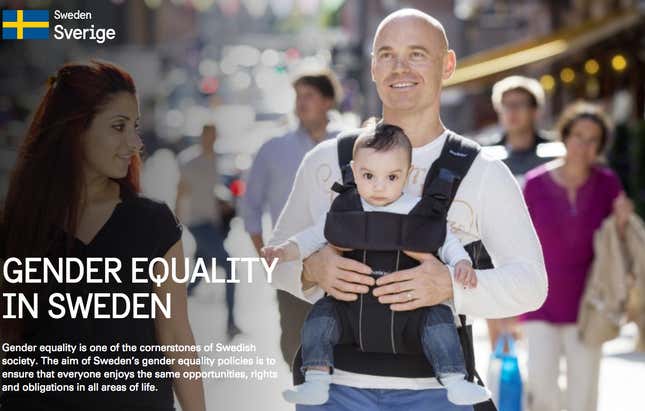In Sweden, one of the world’s most gender-equal nations, guys are having some difficult talks about power, emotional labor, break ups, managing temptation, and parenthood—over dinner.
#Guytalk may sound like it’s related to the kind of “locker room talk” that US president Donald Trump has referred to, but it’s actually the opposite, an effort to reduce sexism and encourage self-reflection. The concept—dinners for “starting conversations about what it’s like to be a man”—was hatched by the non-profit Make Equal in 2016. Organizers can download free materials provided by Make Equal as a starting point to ask tough questions over meals, which are being held in cities throughout northern Europe. Sex, porn, love, ego, avoidance, fragility, violence, and friendship top the list of topics.
Warm-up true/false statements are provocative. One asks, “True/False: I’ve felt inadequate in a relationship.” Tips to guide the conversation include saying “I” instead of “men” or “us” and reassuring participants that it “takes courage and trust to share your experiences…The goal is not to say the ‘right’ thing.” The choices of venue, food, and drinks are left entirely up the hosts.
It’s probably not surprising that #Guytalk emerged in Sweden, a country in which “gender equality is one of the cornerstones,” according to the Swedish government. (Its website features a man carrying an infant in a chest-worn BabyBjorn.) Swedish parents receive 480 days, about 16 months, of paid parental leave. All employers are required to actively pursue goals to equalize opportunities for men and women, and prevent sexual harassment, not just investigate it. The pay gap between men’s and women’s salaries is just 0.5% once accounting for differences in profession, sector, position, work experience and age (it’s 88% in absolute terms).

But all is not perfect in Scandinavia. Men in Sweden (like the rest of the world) have higher rates of suicide, assaults, and incarceration and are less likely to have close friends than women. Domestic violence against women is slightly higher than the global average of 30%, and far higher than the EU average of 22%, according to a 2016 study in the Journal of Social Science & Medicine. Cultural attitudes still lag behind more recent gender equality laws passed in the last few decades. Men only take 25% of the parental leave time allotted to both parents. Leadership positions in Nordic corporations are also held largely by men: Just 6% of executives were female in 2013, and the share of female entrepreneurs is below 10%, under the European Union average.
Make Equal would like to move the needle on true gender equality. ”Women have worked long and hard to free themselves from the negative aspects of gender norms,” the organization states. “Isn’t it time for [men] to grab a dinner or a coffee and talk about how we can break free?”
The group has updated its idea for the #MeToo movement, and for workplaces. A version of the program for co-workers , asks participants whether they would agree with the statements “I tend to take up too much space in conversation with others” or “I often have a hard time admitting when I’ve made a mistake.”
Those are not questions that the Swedish entrepreneur Patric Palm, CEO and co-founder of the planning software company Favro, ever talked about with other men, he said. Palm recently attended a #Guytalk with men ranging from 23 to over 40, including prominent politicians, startup founders, and the captain of a Swedish sports team. The group talked frankly about masculine stereotypes emphasizing strength and reserve, and how they were leading to loneliness, depression, and other problems. “I already knew intellectually that as men we don’t really talk about these things with each other,” he says. “Emotionally, it was a bit awkward. I never have conversations like this…But I thought, ‘Wow this is healthy.’ It was kind of an un-catalyzed need.”
